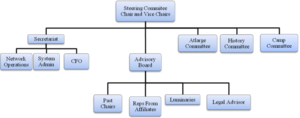Asia Pacific Networking Group
 | |
| Type: | Non-profit organization |
| Industry: | Internet |
| Founded: | 1999 |
| Founder(s): | Kilnam Chon, Tommy Matsumoto |
| Headquarters: | intERLab, c/o Asian Institute of Technology (AIT), P.O. Box 4, Klong Luang, Pathumthani 12120 |
| Country: | Asia Pacific |
| Website: | APNG |
APNG is an acronym for Asia Pacific Networking Group. It is an Internet organization, which is committed to the progress of networking infrastructure in the Asia-Pacific region. It also focuses on the research and development of various other technologies related to networking and online services across this region. The countries who are currently participating in APNG are Afghanistan, Australia, Bangladesh, Brunei, Bhutan, Cambodia, Canada, China, Hong Kong, India, Indonesia, Korea, Japan, Macau, Malaysia, Mongolia, Nepal, New Zealand, Pakistan, Philippines, Russia, Singapore, Sri Lanka, Taiwan, Thailand, USA and Vietnam.
Organizing structure

APNG functions under the coordination of the Steering Committee and a Secretariat. They hold yearly forums at various places in the Asia-Pacific region. These meetings focus on discussions and seminars on topics germaine to the Internet and related technologies.[1]
Objectives
APNG’s main mission is to promote interactions between the network and inter-connectivity in the region, and to promote Internet and related services and infrastructure in the Asia-Pacific Region, thus playing a key role in the growth of the Internet in the region.
The main goals of the group are as follows:
- To become an organization that acts as a centre for Internet providers in the Asia Pacific region.
- To create adequate resources and funds for promoting the development of Internet technology in the region.
- To promote the participation of the next generation in the organization.
- To become aware of each country's history related to Information Technology and Internet development.
- To educate next generation members with the experience of senior members.
- To share pertinent information within the group.
- To promote APNG amongst the next generation through APNG camps.
- To create infrastructure and resources, to provide opportunities for Internet growth in the group countries.
- Provide a place and opportunity of discussion for developing countries.[2]
Activities
APNG, through its various activities and awareness programs, has formed different organizations in the region, such as the Asia Pacific Network Information Centre (APNIC), Asia & Pacific Internet Association (APIA), Asia Pacific Top Level Domain Association (APTLD) and Asia Pacific Computer Emergency Response Team (APCERT).[3]
APNG Camp
APNG camp is a camp for the Next Generation leaders of APNG, where the senior members of the organization and the Next Generation members learn and work together. Through these camps, APNG promotes various activities of the Next Generation and serves as a platform to share information, discuss issues, and plan opportunities for developing countries. These camps also assist in understanding the Asian view of the Internet and thus create opportunities keeping the perspectives in mind. These camps also focus on researching on various technological as well as non-technological aspects, which may assist in the development of the Internet in the Asia-Pacific region. The camps are held regularly at various international locations.[4]
Internet History Museum
The group believes that the history of the Internet in various countries in the region is important and hence should be conserved. The Internet History Museum will showcase the development and propagation of Internet in the Asia-Pacific region.[5]
At Large
At Large is a community of individual Internet users who take part in the development of policies under the assistance of ICANN.[6] APNG supports this community's members, thereby assisting ICANN in its policy development work. APNG also assists ICANN in the establishment and growth of APRALO (Asia-Pacific Regional At-Large Organization).[7]
